- Home
- Susan Beth Pfeffer
The Beauty Queen Page 3
The Beauty Queen Read online
Page 3
“It’s probably your best bet. Of course you could do one of your speeches from The Miracle Worker.”
“Sure,” I said. “‘Wah wah’ should go over really big.”
“Well it would be different.”
“While we’re on the subject, do you have an evening gown I could borrow?”
“Really, Kit,” Greg said. “There is a limit to bad taste.”
I laughed. “Mom told me to ask my friends, and you’re a friend. I need one for the contest.”
“Afraid I can’t help you,” he said. “Have you asked Lynn?”
“Lynn is five feet tall,” I said. “I’m five seven. Any evening gown of hers would be a mini skirt on me.”
“You have a point. Why don’t you buy one?”
“Knowing Mom, we probably will. I’m just trying to save us money.”
“Oh,” Greg said. Greg gets embarrassed when he thinks of his having money, and my not. It doesn’t bother me, but it upsets friends of mine sometimes.
“Don’t worry about it,” I said. “Look, treat me to lunch, and then you won’t feel so guilty.”
“I don’t feel guilty,” Greg said. “But I’ll treat you to lunch anyway.”
“Good,” I said. “Because I don’t feel like going home and eating. Marly’s started a diet, and if I have anything more caloric than cottage cheese, she’ll give me this really pathetic look and I’ll feel guilty.”
“Fair enough,” Greg said. “I promise not to notice when you have franks and beans and baked Alaska.”
“What a great lunch,” I said. “And then when we’re through, you can drop me off at the Clarion for an interview.”
“I feel like James Mason in A Star Is Born,” Greg said. “Escorting the big movie star around.”
“Just you wait,” I said. “One of these days I will be a star, and then you’ll know true humiliation.”
“You know,” Greg said, “there are times when I almost believe you.”
Chapter 3
Sheila King, culture reporter for the Great Oaks Clarion, seemed pleased to see me. I liked her, or at least her reviews. The other reviewer for the paper had a grudge against the Red Barn, the community theater where I worked, and frequently panned perfectly good shows. She also gave good reviews to friends even if they didn’t deserve them. Sheila, on the other hand, was as objective as it’s possible to be with a community theater in a small town. At least with her, there was a fighting chance.
“You must be very embarrassed,” she said after exchanging hellos.
“I am,” I admitted. “What made you realize it?”
“I was reading over the reviews I did of your stuff,” she said. “You rated some really good adjectives.”
“My first year everything I did was called ‘promising,’” I said. “Then I worked my way up to ‘extremely promising.’”
“How old were you?” she asked.
I thought about it. “Ten, I think. I was eleven when they did The Bad Seed and then The Miracle Worker. After that I hit the awkward age and didn’t do much of anything except grow.”
“How tall are you?”
“Five seven,” I said. “And I’ve been five seven since junior high. It was very embarrassing then.”
“I was fat,” Sheila said. “Until college.”
“My sister, Marly, just started a diet,” I said. “She wants to lose weight before she starts high school.”
“Not a bad idea,” Sheila said. “I didn’t have a single date until I left home. Do you date much?”
“Enough,” I said.
“Anyone right now? Anything serious?”
“What is this, an interview or an engagement announcement?”
“For this paper, a little of both,” she said. “Why not get engaged and give me the scoop?”
“Sorry,” I said. “No one serious. I’m only eighteen.”
“Didn’t you go out with Jim Taylor for a while?”
“No,” I said. Actually I had, and Sheila knew it, but Jim was a nice guy and I was underage at the time. “I know him though.”
“I always liked Jim,” Sheila said. “He’s a good actor.”
“Pretty good,” I said. “He’s weak on comedy.”
“I don’t know,” she said. “But I guess this isn’t the time to discuss that.”
“I don’t care,” I said. “I’m not interesting enough for an interview.”
“That may be,” Sheila said. “But I’m getting paid to prove you wrong.”
“Okay,” I said. “What do you want to know?”
“What made you enter the contest?”
“My mother forced me,” I said.
“Did you think you’d win?”
“No,” I said.
“Were you very excited?”
“No.”
“I’ll change that to yes,” she said. “You don’t mind, do you?”
“No,” I said. “Say that I was thrilled. They’re always thrilled when they win these things.”
“What do you think your chances are for the county?”
“Bad. Great Oaks never makes it to anything big.” I thought for a second. “Make that off the record, would you? I’m supposed to be full of boosterism.”
“Something modest, but full of pride for your home town,” Sheila said. “This should be a fun article to write.”
“Did you always want to be a reporter?”
“Yeah,” she said. “But I didn’t think I’d end up here.”
“Why did you?”
“A bad sense of geography,” she said. “You’re not supposed to ask me the questions. What was your favorite part?”
“That’s a good question,” I said. “Favorite part that I played?”
“Yeah.”
“Eliza in Pygmalion, I think. I’d really love to have played Annie Sullivan in The Miracle Worker, but they said I was more the Helen Keller type.”
“And what part would you most like to do?”
“All of them,” I said.
“What are your plans for this fall? College?”
“Probably,” I said. “My mother wants me to go to school here, and they accepted me, so I probably will.”
“You don’t sound very enthusiastic.”
“Forgive me,” I said. “This is going to lack boosterism, but their drama department isn’t much. I’ve done some shows with them, and there’s nothing they can teach me any more.”
“So you want to be an actress?”
“I am an actress,” I said. “I want to be a professional.”
Sheila laughed. “You have the ego for it.”
“I know,” I said. “It drives my mother crazy, and sometimes my directors, but that’s just the way it is. I don’t want to be a star. I don’t even want to be on Broadway particularly. I just want to act and earn enough money to stay alive and, hopefully, to learn while I’m doing it.”
“Your guidance counselors must have loved you,” Sheila said.
“Oh lord,” I said. “They were awful. Very college oriented. Constantly harping on my IQ, which is adequate, but not much better. And my sister, Marly, who’s incredibly smart, she eats facts alive, they keep telling her she should belong to more clubs. She’s not social enough. They’re very big on well-roundedness.”
“They told me women couldn’t be journalists,” Sheila said. “Sometimes I think they were right. What kind of name is Marly?”
“It isn’t,” I said. “It’s short for Marlene. I couldn’t say Marlene when she was born, so I called her Marly, and it stuck. My mother thought it was cute.”
“Poor Marly,” Sheila said.
“She does okay,” I said. “Even with a cute name.”
“What does your father do?”
“He’s a salesman. He and my mother are divorced. My mother’s a nurse.”
“How long has your family been in Great Oaks?”
“Too long,” I said. “Ten years.”
“You’re right,” Sheila said.
“Any beauty tips?”
“What?”
“You know, beauty tips. Cucumber baths, stuff like that.”
“Soap and water and eight hours sleep. How does that sound?”
“Very wholesome,” Sheila said. “Okay, that should do it.”
“I hope your next job is more interesting,” I said.
“I’ve given up on my next job already,” she said. “I’m putting my hopes on my next incarnation.”
“Good luck with it,” I said. “When do you think they’ll print the interview?”
“Possibly tomorrow, more likely the day after. Why? Don’t you get the paper every day?”
“We’re poor people,” I said. “We do without such luxuries.”
“Well, someone will tell you about it,” she said. “Thanks for coming in.”
“Thanks for having me,” I said. “Good-by.”
I walked home after that, stopping at a candy store to buy copies of the paper. I figured two would be enough. The man there congratulated me, which I thought was pretty funny. I’d never been a celebrity before.
Lynn was waiting for me when I got there. She and Marly were sitting in the living room watching a soap opera. Lynn’s addicted on school vacations.
“Shh,” she said before I even said hello. “Joe’s trying to get the tape.”
“Oh,” I said. Marly shrugged.
We waited for a commercial, and then Marly said, “The mayor called. He said you could call back before three.”
“The mayor?” I asked. “I must be famous.”
“He probably wants your endorsement,” Lynn said. “He’s running for re-election this year.”
“He’s a Republican,” I said. “I never endorse Republicans.”
“Wise,” Lynn said. “Wait until the soap’s over, and I’ll listen on the extension.”
“Only if you don’t giggle,” I said.
“Giggle?” Lynn said. “I’m sobersides herself.”
“I seem to recall one history test where you found an essay question so funny they had to kick you out of the classroom.”
“That was different,” she said. “It was a very funny essay test, especially if you hadn’t studied. They asked what the chief sources of income were in the ante bellum South, and all I could think of was prostitution. Actually, the question wasn’t as funny as my answer would have been.”
“Cotton,” Marly said. “And tobacco probably. It was a very agricultural place.”
“Shut up,” Lynn said. “The show’s starting again.”
We watched somebody sneak around someplace. Lynn seemed very nervous until it was over, and then she predicted death for somebody. I predicted death for her if she didn’t turn the TV off so I could call the mayor.
Mayor McGowan had been at our graduation, probably because it was an election year, and he’d said a couple of platitudes about working within the system and standing proud as we did it. He was a tall man, fairly attractive, who looked as if he wanted to end up on a postage stamp. Except Great Oaks never made it to anything big. His secretary put me right on. I could hear Lynn stifling a giggle.
“Hello, Miss Carson,” McGowan said. “I’m glad you called.”
“Thank you for calling me,” I said. “What can I do for you?”
“Nothing,” he said. “I just wanted to extend my congratulations on your victory last night. Jack Davis told me he was sure you’ll win in the county contest also. As a matter of fact, he said he wouldn’t be surprised if you made it all the way.”
“Thank you,” I said. “I have a long way to go.”
“Of course,” he said. “However, even if it should end here, you can be very proud.”
“Thank you,” I said. I wished someone would explain what I was supposed to be so proud of, besides being good-looking. I didn’t even wear make-up. I didn’t do anything except keep my nose from getting broken, and that didn’t seem like much of an accomplishment.
“I hear you’re quite an actress too,” he said.
“Thank you,” I said. “Have you ever been to the Red Barn Theater?”
“I’m afraid not,” he said. “You know how busy we politicians are.”
“Sure,” I said. “The President hasn’t made it there yet either.”
The mayor laughed. “Jack told me about your sense of humor,” he said. “Brains as well as beauty.”
Lynn snorted in the background. “God bless you,” I said, to cover any possible embarrassment.
“You know, as Miss Great Oaks you will have a couple of obligations,” he said. “Entering the county contest, of course.”
“Of course,” I said.
“And being at the July Fourth fireworks,” he said. “We like to have our Miss Great Oaks there every year.”
“I go anyway,” I said.
“Fine,” he said. “Well, thank you for calling me back, and I’ll see you on the Fourth.”
“Thank you,” I said. “Good-by.”
“Since when do you always go to the fireworks?” Lynn asked, as she joined us in the living room.
“I used to,” I said. “Until a couple of years ago. Last year I went with a whole bunch of people. We were all stoned. Fireworks look great when you’re stoned.”
“Don’t be stoned this year,” Lynn said. “It would be awful to be busted when you’re seizing power.”
“Power,” I said. “Right now I wish I had some.”
“How did the interview go?” Marly asked.
“Pretty good,” I said. “I like Sheila King.”
“Yeah, she’s all right,” Lynn said.
Lynn and I had started at the theater at the same time. I started because I was going to be an actress or die. Lynn was dragged there by a stage mother. We met during auditions. I got the part, and Lynn got a smaller one. Lynn loved the theater, but hated everything about acting. She just barely learned her lines, but after a week of performances, she knew how to run the light board. No one trusted her with it until she started high school, and by then she’d learned where to set lights as well. Lynn was planning on going to college and majoring in theater. By the time she graduated, she hoped they’d be letting women into the union. Except for the theater, we didn’t have much in common, but, except for theater, there wasn’t much else that interested me. The only other reason Lynn’s friendship was strange was her height. Lynn was my only really short friend.
“What did you tell her?” Marly asked.
“I told her how smart you are,” I said.
“You shouldn’t have,” Marly said. “You should have just talked about yourself.”
“Kid, you’d make a great actress,” Lynn said. “As long as you practice what you preach.”
“I talked plenty about myself,” I said. “As a matter of fact, I’m a little sick of the subject.”
“I don’t know why,” Lynn said. “How could you possibly tire of discussing your auburn hair.”
“How’d you hear about that?”
“It was in the paper,” she said.
“Oh,” I said. “I bought some copies, but I haven’t read it yet.”
“I told Greg how annoyed I was,” she said. “You’ve violated all the principles of women’s lib.”
“Yeah, I heard. When women’s lib pays me fifty dollars for having red hair, I’ll repent.”
“I always said you’d sell yourself out at the first opportunity.”
“Until I can afford not to, sure,” I said. “So would you.”
“Are you going to enter the county contest?”
“Of course,” Marly said. “She has to. It’s the law.”
“I don’t think they’d arrest her if she didn’t,” Lynn said.
“I won’t give them the chance,” I said. “Besides, it’s my golden opportunity. They have a talent competition.”
“You’re kidding.”
“Not according to Mom. And I’m sure she researched it thoroughly.”
“Talent?” Marly asked, “Like singing?�
��
“Like singing,” I said. “That pretty well describes my talents.”
“You don’t have to sing,” Marly said. “You could act something.”
“I could indeed,” I said.
“Shakespeare,” Lynn said. “They love Shakespeare at things like that. It makes them feel cultured.”
“Greg suggested something from Anne Frank. Something heart-warming, with a message.”
“For that you could read a Christmas card,” Lynn said. “Stick with Shakespeare.”
“You know, it’s fun,” I said. “People have been making a fuss over me. I like that.”
“I’ve noticed,” Lynn said. “Just don’t get unbearable.”
“Not over this,” I said. “But I am sort of enjoying it. When I don’t think about it. When I do, I get embarrassed.”
“I would have hated standing there in my bathing suit,” Lynn said. “Of course, I have big hips and a belly. Both of which you’re missing.”
“It was cold,” I said. “I told Mom it would be. Hey, do you know where I could get a cheap evening gown?”
“I don’t suppose you’d want to borrow mine,” she said. “You could put some ruffles on it.”
“I don’t think so,” I said.
“Doreen Richmond’s about your height,” Lynn said. “She wore a nice gown to the prom. Demure, but you don’t want to get too sexy until the state finals.”
“I love the way people assume I’m going to win the county contest.”
“Yes,” Lynn said. “You do. I think Doreen would let you borrow it. It should appeal to her sense of humor.”
“I’ll call her later,” I said. “What color is it?”
“White, I think,” she said. “Possibly pale pink. Something unimaginative.”
“It’ll have to do,” I said. “We can’t afford to buy one.”
“Maybe you ought to,” Marly said. “I could loan you some money. I have some saved up, and Dad gave me some last night. I don’t know if you should wear somebody else’s dress for something important.”
“Don’t worry about it,” I said, loving Marly just because she did. “First of all, nobody will know, and second of all, it’s not important.”
“It is,” she said. “You should look your very best.”
“Listen to the girl,” Lynn said. “She speaks with the voice of experience.”
Marly gave her a look, and I loved her for that too. “Just remember,” she said. “It’s important that you should look your best.”

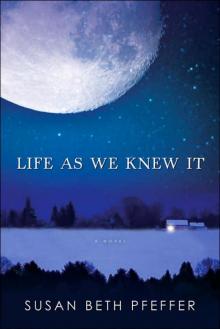 Last Survivors 01 - Life as We Knew It
Last Survivors 01 - Life as We Knew It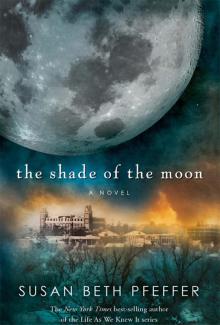 Last Survivors 04: Shade of the Moon
Last Survivors 04: Shade of the Moon Thea at Sixteen
Thea at Sixteen Kid Power
Kid Power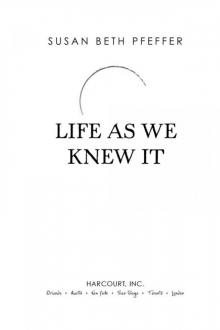 Life as We Knew It
Life as We Knew It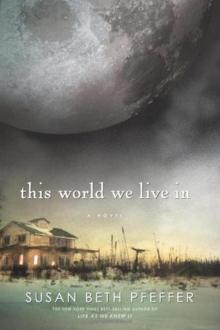 This World We Live In
This World We Live In Meg at Sixteen
Meg at Sixteen Blood Wounds
Blood Wounds The Beauty Queen
The Beauty Queen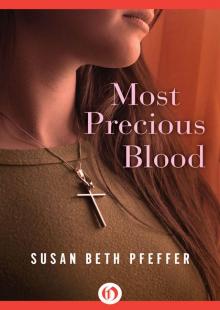 Most Precious Blood
Most Precious Blood The Dead and the Gone
The Dead and the Gone Sybil at Sixteen
Sybil at Sixteen Evvie at Sixteen
Evvie at Sixteen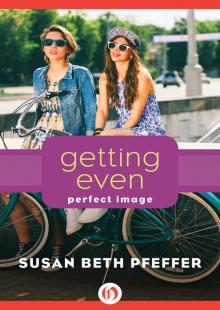 Getting Even
Getting Even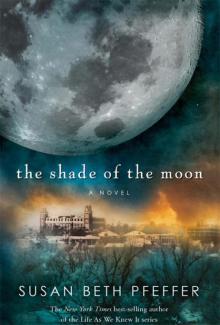 Shade of the Moon ls-4
Shade of the Moon ls-4 The Dead and Gone
The Dead and Gone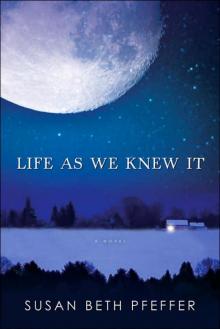 Life As We Knew It lawki-1
Life As We Knew It lawki-1 Fantasy Summer
Fantasy Summer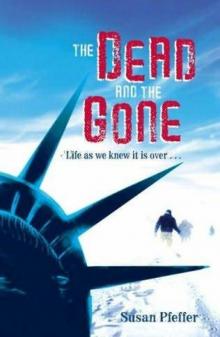 The Dead and the Gone ls-2
The Dead and the Gone ls-2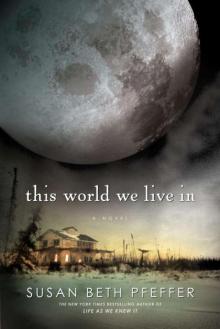 This World We Live In ls-3
This World We Live In ls-3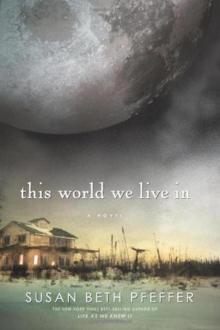 This World We Live In (The Last Survivors, Book 3)
This World We Live In (The Last Survivors, Book 3)